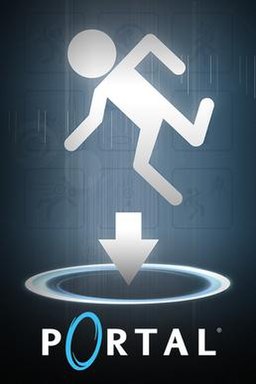| Portal | |
|---|---|
 Portal's box art displays part of one of the signs commonly used in the game's environment. | |
| Developer(s) | Valve Corporation |
| Publisher(s) | Valve Corporation Microsoft Game Studios (XBLA) |
| Distributor(s) | Electronic Arts (retail) Steam (online) |
| Composer(s) | Kelly Bailey Mike Morasky Jonathan Coulton |
| Series | Half-Life |
| Engine | Source |
| Version | Build 4295 |
| Platform(s) | Microsoft Windows,[1] Mac OS X,[1] PlayStation 3, Xbox 360 |
| Release date(s) | |
| Genre(s) | Sci-fi puzzle-platform game |
| Mode(s) | Single-player |
| Rating(s) |
|
| Media/distribution | DVD, digital download |
| System requirements → See Development section for requirements | |
Portal is a single-player puzzle-platform video game developed by Valve Corporation. The game was released in a bundle package called The Orange Box for Microsoft Windows and Xbox 360 on October 9, 2007,[2][3] and for the PlayStation 3 on December 11, 2007.[6] The Windows version of the game is also available for download separately through Valve's content delivery system Steam[1] and was released as a standalone retail product on April 9, 2008.[8] A stand-alone version called Portal: Still Alive was released on the Xbox Live Arcade service on October 22, 2008; this version includes an additional 14 puzzles. A Mac OS X version was released as part of the Mac-compatible Steam platform on May 12, 2010.[10]
The game consists primarily of a series of puzzles that must be solved by teleporting the player's character and simple objects using the Aperture Science Handheld Portal Device (dubbed the "portal gun"), a device that can create inter-spatial portals between flat planes. The player character, Chell, is challenged by an AI named GLaDOS (Genetic Lifeform and Disk Operating System) to complete each puzzle in the Aperture Science Computer-Aided Enrichment Center using the portal gun with the promise of receiving cake when all the puzzles are completed. The unusual physics allowed by the portal gun are the emphasis of the game and are based on a similar concept from the game Narbacular Drop; many of the team members from the DigiPen Institute of Technology that worked on Narbacular Drop were hired by Valve for the creation of Portal.
Portal was acclaimed as one of the most original games of 2007, despite being considered short in length. The game received praise for its unique gameplay and darkly humorous story, created with the assistance of Erik Wolpaw and Chet Faliszek. It also received acclaim for the character of GLaDOS, voiced by Ellen McLain in the English-language version, and the end credits song "Still Alive" written by Jonathan Coulton for the game. Discounting sales through Steam, over four million copies of the game have been sold since its release. The game's popularity has led to official merchandise from Valve including plush Companion Cubes, as well as fan recreations of the cake and portal gun. A sequel, Portal 2, was released on April 19, 2011
No comments:
Post a Comment